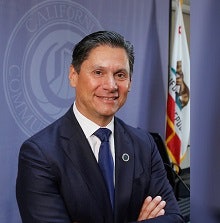Millions of California’s working adults who have a high school diploma and some or no post-secondary education will have a fresh opportunity to enhance their marketability by enrolling in the state’s newest and fully online community college.
Proposed by Governor Jerry Brown and established this June, the California Online Community College seeks to boost social mobility by offering on-demand access to education and workforce training for California’s 2.5 million “stranded” adults aged 25 and older. The college will use a competency-based education model and plans to begin enrolling students in Fall 2019 for short-term credentials in three initial pathway areas – medical coding, information technology and supervisor roles, according to California Community Colleges officials.
“A credential from a California Community College is the path to a better life for millions of Californians,” said California Community Colleges System chancellor Eloy Ortiz Oakley in a statement. “The 115th online college will help increase social mobility for California’s working adults seeking better wages within a rapidly changing economy.”
Key components of the new online college include flexible start times for adult learners that are not tied to the academic calendar, low-cost tuition that includes fee waivers for eligible students and wraparound student support services and partnerships with employers, labor organizations, community-based organizations, existing community colleges and libraries to ensure students’ skills competencies and credential completion.
 Eloy Ortiz Oakley
Eloy Ortiz OakleyOakley is serving as the college’s interim CEO for the time being, and the systems’ Board of Governors will operate in a separate capacity, overseeing the college as its Board of Trustees.
The college will be funded over a period of seven years, ultimately costing $240 million. Part of that funding – $20 million annually – will be used for ongoing spending at the college.
Ensuring that students persist and succeed will have to include financial investment in the online model and supplemental support services, said Dr. Elisabeth A. Barnett, senior research scientist at the Community College Research Center at Teachers College.
Most studies find that student outcomes in online courses do not compare to the outcomes of students taking courses in person, Barnett said, which is especially true of remedial courses. However, online courses can benefit adults and other learners who have work or other responsibilities.
“Adults often really like these [programs] because they fit them in around their schedules,” Barnett added. “Being able to do work on their own schedule is huge.”
Supporters of the online college have praised it as a “game changer.”
But earlier this year, some state legislators, educators and others initially questioned the need for the unprecedented online-only college, pointing to existing online programs in the California Community College system. Other concerns related to if the newly established online college would take away resources from the rest of the system, or if the college’s faculty would join the faculty union.
Chancellor Oakley reaffirmed the need for the online college, saying that it will serve a population of students that is currently underserved by California’s higher education system. System officials also noted that existing online programs are moreso catered to traditional students seeking associates degrees or looking to transfer to four-year institutions.
And at a March 20 hearing about the college, Oakley said that it would “absolutely be a collective bargaining college,” according to EdSource.
An added advantage that Barnett sees is that the online college can use its model to analyze and evaluate how much time a student spends on their coursework. Further, the online element can help leaders and faculty identify students who may be struggling, she said.
Plans for the operations of the online community college continue as leaders are working to evaluate adult learners’ prior knowledge and experiences, seek accreditation and appoint executives.
California Community Colleges officials cited Arizona State University Online, Rio Salado Community College and Colorado State University Online as other institutions to turn to for learning and information gathering.
Last week, the California Online Community College District Board of Trustees announced that it had selected Wheless Partners Consulting and Executive Search to lead the national search for the CEO of the online college.
“To be successful, the new online college needs an energetic and innovative CEO,” Board of Trustees Chair Tom Epstein said. “We are seeking candidates from industry and education with the skills and experience to bring the college rapidly from early stage development to scale.”
Tiffany Pennamon can be reached at [email protected]. You can follow her on Twitter @tiffanypennamon.















